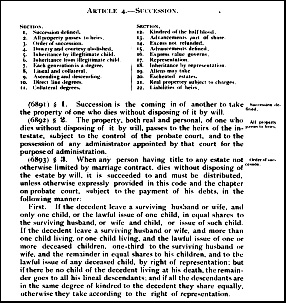Those 1890 statutes
The Legal Genealogist is heading off to Oklahoma tomorrow, to speak at the Oklahoma Genealogical Society conference on Saturday and — with any luck at all — to track down some elusive Tillman County ancestors in the newspaper collection of the Oklahoma History Center.
 In preparing for this trip, I was doing my usual routine of poking around in the local statutes and came across something that really reinforced a point I try to make all the time.
In preparing for this trip, I was doing my usual routine of poking around in the local statutes and came across something that really reinforced a point I try to make all the time.
The common law wasn’t really all that common in huge parts of the United States.
Huge swaths of the United States were once under the control of the French or the Spanish,1 and the legal tradition they brought with them when they came into the Union was the tradition of the civil law — the law based in the 6th century Justinian Code2 — not the English common law.
And remnants of that civil law tradition persisted for a time — sometimes even to today — in the laws of the newly created territories or newly admitted states.
Case in point: Oklahoma.
The land that eventually became the State of Oklahoma was first part of the French territory known as Louisiana. It “did not become part of the United States until 1803, when the new American republic acquired the Louisiana Purchase. The U.S. Congress divided the purchased domain into two territories: Orleans in the south and Louisiana in the north. The Territory of Louisiana included what is now Oklahoma and had its administrative center at St. Louis. In 1812 northern Louisiana became the Territory of Missouri; in 1819 southern Louisiana, including Oklahoma, was organized as the Territory of Arkansas. The territorial governors of Arkansas exercised administrative jurisdiction over Oklahoma for the next thirty years.”3
On 2 May 1890, the Territory of Oklahoma was created in what’s generally called the Organic Act.4
And when the Territorial Legislature met in 1890, it passed a whole set of statutes — the very first official laws of the Territory of Oklahoma.5 And some of those very first official laws make it crystal clear that the template on which they were based was the civil law, not the common law.
In the common law, the language typically used to describe the process of property descending from one generation to another is probate,6 and where the deceased leaves no will the specific term used is descent.7 In the civil law, the term for the descent of property from one generation to another without a will is succession.8
Guess which word the Oklahoma Territorial Legislature used in its very first set of statutes?
Yep.
Succession, defined in the statute as “the coming in of another to take the property of one who dies without disposing of it by will.”9
There are other bits and pieces like this scattered throughout the statutes, but just this one word serves as a powerful reminder that this nation’s legal heritage — like its genetic heritage — is a blend.
SOURCES
- See generally Wikipedia (http://www.wikipedia.com), “United States territorial acquisitions,” rev. 17 Mar 2015. ↩
- See “Roman Legal Tradition and the Compilation of Justinian,” The Robbins Collection, Boalt Hall (https://www.law.berkeley.edu/library : accessed 25 Mar 2015). ↩
- “Westward Expansion, 1803–1861,” The Encyclopedia of Oklahoma History and Culture, Oklahoma History Center (http://www.okhistory.org/ : accessed 25 Mar 2015). ↩
- “An act to provide a temporary government for the Territory of Oklahoma, to enlarge the jurisdiction of the United States Court in the Indian Territory, and for other purposes,” 26 Stat. 81 (2 May 1890). ↩
- See The Statutes of Oklahoma 1890 (Guthrie, Okla. : State Capital Printing Co., 1891); digital images, Google Books (http://books.google.com : accessed 25 Mar 2015). ↩
- See generally Henry Campbell Black, A Dictionary of Law (St. Paul, Minn. : West, 1891), 945, “probate.” ↩
- Ibid., 359, “descent.” ↩
- Ibid., 1133, “succession.” ↩
- Chapter 88, article 4, The Statutes of Oklahoma 1890, at 1211. ↩



While researching in Louisiana, I learned about “Succession” and “Tutors.” I didn’t realize that areas other than Louisiana used these terms.
Louisiana wasn’t the only place impacted by civil law — it’s just the one place in the continental US that’s still mostly under civil law!
would I be able to sue ,my siblings, its my understanding that they kept me from my father the last week of his life and wasn’t no longer poa, over his medical or estate. ,Oklahoma
This blog cannot give legal advice, so if you need an answer to that question, you need to consult with a licensed attorney in your jurisdiction.